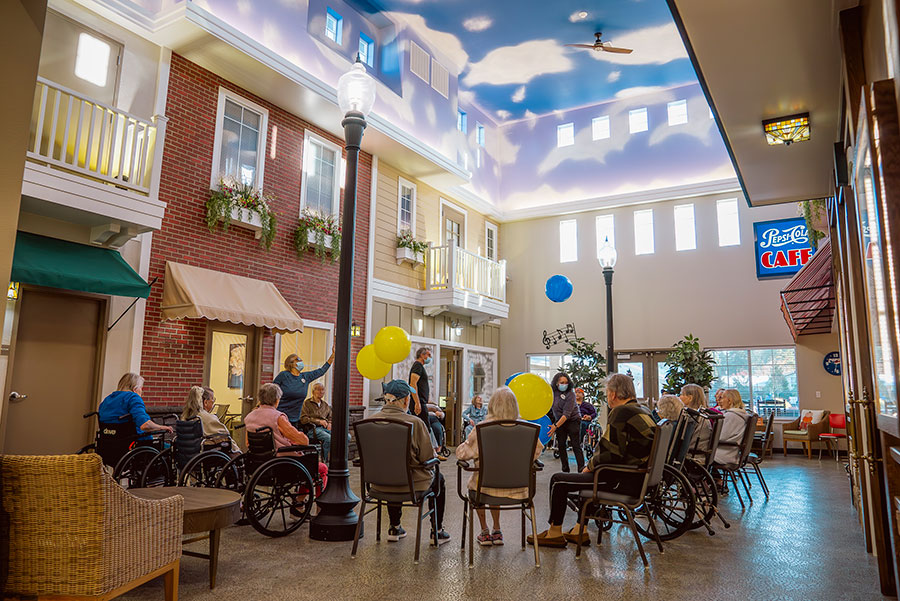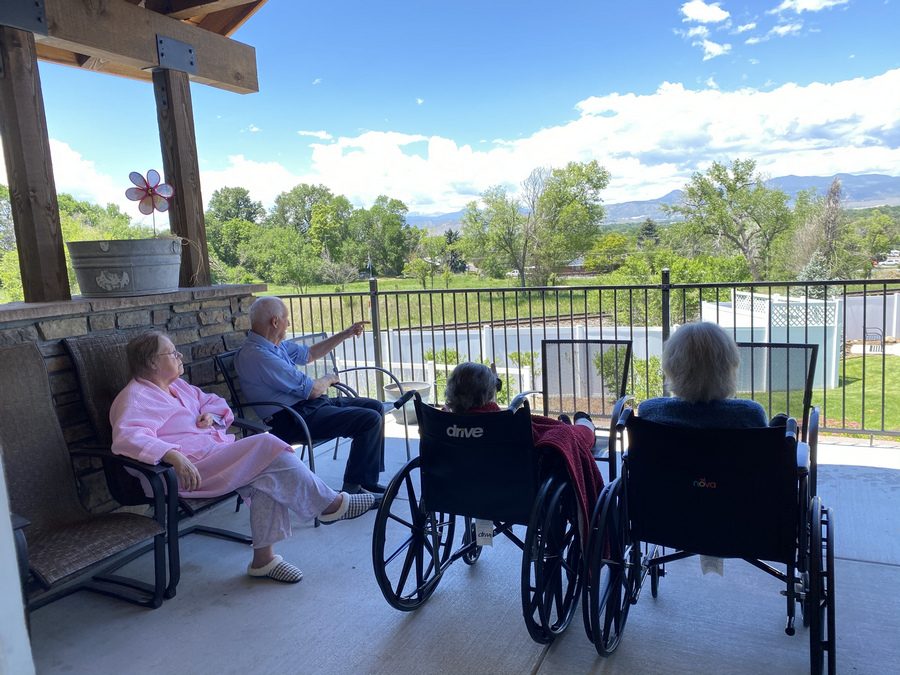Boutique Memory Care Communities That Feel Like Home
Boutique Memory Care Communities That Feel Like Home
Blog Article
Everything About Memory Care Solutions: Why Tiny Memory Care Houses Are a Terrific Choice
Memory treatment services play an essential duty in supporting people with Alzheimer's and dementia. Small memory treatment homes attract attention for their customized technique and intimate setting. With reduced staff-to-resident proportions, these homes foster stronger connections and customized treatment. Locals benefit from enhanced social interactions and a secure setting. As family members explore alternatives, understanding the one-of-a-kind benefits of tiny memory treatment homes becomes essential. What elements should be taken into consideration when picking the right home?
Understanding Memory Treatment Solutions
While numerous may be acquainted with basic elderly treatment choices, recognizing memory treatment services is important for households facing the difficulties of cognitive decrease. Memory treatment particularly accommodates individuals with problems such as Alzheimer's illness and other types of mental deterioration. These solutions provide an organized environment that concentrates on enhancing the lifestyle for homeowners through specialized care and support.Memory treatment facilities are developed to guarantee safety and safety and security, commonly featuring secured atmospheres to protect against wandering. Trained employee are available around the clock to aid with daily tasks, medicine monitoring, and individual care. Furthermore, memory treatment programs commonly include cognitive excitement activities, customized to engage homeowners and promote mental well-being. Households can gain from comprehending these solutions, as they make it possible for informed decisions regarding their liked ones' treatment, ensuring that their specific needs and choices are dealt with in a supportive and compassionate way.
The Benefits of Tiny Memory Treatment Residences
Small memory care homes provide unique benefits that can significantly boost the top quality of life for locals with cognitive impairments. One significant benefit is the intimate atmosphere, which enables for individualized interactions amongst staff and residents. This smaller setup cultivates purposeful partnerships, decreasing feelings of isolation and anxiety frequently experienced by individuals with memory issues.Additionally, the lower staff-to-resident proportion in little memory care homes allows caretakers to supply more attentive guidance and support. This approach not just improves safety and security however likewise advertises a feeling of safety for the residents.Moreover, small memory treatment homes can adapt quickly to the unique requirements and preferences of each homeowner, permitting a more homey environment. Such an environment can urge social interaction and participation in tasks, eventually enhancing the daily experiences of those living with cognitive problems.
Personalized Care Program for Citizens
Customized treatment plans are vital in memory treatment homes, as they provide to the distinct demands and choices of each citizen. These plans start with detailed analyses performed by experienced professionals, who examine cognitive capabilities, case history, and personal passions. This tailored approach assurances that care is not only efficient yet also respectful of each person's dignity and autonomy.Moreover, personalized treatment strategies are flexible, enabling changes as residents' demands evolve gradually. This versatility promotes a complacency and experience, which is important for people coping with memory challenges. Caregivers are trained to implement these plans constantly, supplying assistance that aligns with the locals' routines and preferences.Ultimately, customized care plans improve the high quality of life for citizens by advertising health, engagement, and independence, making them an essential element of memory treatment solutions in tiny memory care homes.
Producing a Home-Like Atmosphere
Creating a home-like environment is essential for cultivating convenience and familiarity in memory treatment setups, as it considerably impacts locals' psychological wellness. Small memory care homes often focus on tailored touches, such as warm shade combinations, family members images, and acquainted furniture arrangements, which aid citizens feel a lot more comfortable. Incorporating components reminiscent of a traditional home, like comfortable space and public locations, urges a feeling of belonging.Moreover, making use of all-natural light and outside spaces can boost the environment, promoting relaxation and peace. Employee play a substantial function in keeping this environment by engaging with homeowners in a compassionate fashion, treating them like family. Regular activities, such as cooking or horticulture, can additionally contribute to a home-like feel, using possibilities for locals to take part in purposeful experiences. In general, developing a nurturing atmosphere sustains cognitive feature and emotional security, making it an important element of memory treatment services.
Improved Social Interaction and Neighborhood
Improved social communication and neighborhood are important elements of memory treatment solutions. By fostering personalized social interaction and producing a family-like atmosphere, these services promote significant connections amongst homeowners. Group tasks and events better urge participation, assisting people feel extra consisted of and sustained.
Customized Social Interaction
While social communication is essential for overall well-being, many people with memory problems usually have a hard time to involve meaningfully with others. Personalized social engagement in memory treatment homes addresses this difficulty by creating tailored activities that deal with homeowners' special rate of interests and abilities. By focusing on individual preferences, caregivers can promote connections that resonate deeply with each individual. Tasks such as art therapy, songs sessions, and led discussions promote cognitive excitement and psychological expression. Additionally, small group settings motivate friendship and permit even more intimate interactions, boosting feelings of belonging. This strategy not just battles feelings of isolation but additionally encourages locals to keep a feeling of identity, inevitably adding to boosted psychological health and wellness and lifestyle.
Family-like Atmosphere
In a memory treatment setting, fostering a family-like environment substantially improves social communication and builds a feeling of community among homeowners. Smaller memory treatment homes usually prioritize intimate atmospheres, permitting residents to form closer links with one another and team members. This nurturing environment promotes depend on, which is crucial for individuals with memory disabilities. Homeowners are most likely to engage in discussions and share experiences, creating a supportive network that alleviates feelings of solitude. The knowledge of shared areas and regimens adds to a sense of belonging, better encouraging social interaction (personalized memory care). In such settings, emotional bonds grow, leading to improved general health and a better of life for homeowners as they browse their daily experiences with each other
Team Activities and Occasions

Safety and Safety And Security Functions in Tiny Houses
Numerous little homes designed for memory treatment integrate essential security and protection attributes to assure the health of residents. These homes frequently utilize protected entrance and exit factors to prevent straying, a common problem resource among individuals with memory impairments. Furthermore, surveillance systems and alarm system systems boost surveillance, making certain that personnel can quickly react to any type of uncommon activities.Interior formats are tailored for security, with reduced risks such as sharp corners and clutter-free paths. Handrails and non-slip flooring are typically set up to lower the danger of drops. Personnel are educated in emergency procedures, ensuring they are planned for different situations.Moreover, personalized treatment strategies may include evaluation of specific safety requirements, offering customized remedies for each and every citizen. In general, these security and security functions produce a caring setting where homeowners can prosper while keeping their self-respect and independence.
How to Choose the Right Memory Treatment Home
How can families guarantee they choose the most suitable memory care home for their liked ones? The choice requires cautious factor to consider of numerous aspects. Family members must assess the facility's personnel qualifications and training, ensuring that caregivers are experienced in taking care of memory-related conditions. Next off, it's essential to evaluate the home's setting, focusing on security attributes and whether it promotes a feeling of area and belonging. Visiting the facility can offer insight right into everyday tasks and the social environment, which are important for mental excitement and psychological wellness. Additionally, families need to ask about the care plans supplied, guaranteeing they are tailored to specific requirements. Considering the home's area and availability for family check outs can contribute to a smoother change. By attending to these aspects, family members can make an enlightened choice that prioritizes their liked one's convenience and lifestyle in a memory treatment setup.
Often Asked Inquiries
What Certifications Should Staff Members in Memory Care Houses Have?
Employee in memory treatment homes ought to important source possess pertinent qualifications, experience in mental deterioration care, solid interaction skills, and empathy. Ongoing training in behavior administration and therapeutic treatments improves their capacity to support homeowners successfully.
Just How Do Memory Treatment Services Differ From Standard Assisted Living?
Memory care services concentrate especially on people with memory disabilities, providing specialized assistance and structured settings. On the other hand, standard assisted living supplies basic aid with everyday activities, doing not have the customized approach required for those with cognitive obstacles.
What Types of Activities Are Provided in Memory Treatment Homes?
Memory treatment homes normally use a variety of activities made to involve locals. Typical choices consist of art treatment, songs sessions, cognitive video games, workouts, horticulture, and get-togethers, all focused on improving well-being and cognitive feature.
Can Citizens Bring Their Own Valuables to Memory Care Houses?
Homeowners can normally bring their very own items to memory treatment homes, permitting them to customize their living space - personalized memory care. This method assists develop an acquainted atmosphere, promoting convenience and a sense of identity for the people

Exactly How Are Member Of The Family Associated With the Care Process?
Member of the family play an essential role in the care process, typically joining decision-making, participating in treatment conferences, and supplying psychological support. Their participation fosters a collaborative environment, boosting the resident's total health and lifestyle. While numerous might be acquainted with general senior care choices, recognizing memory care solutions is crucial for families dealing with the obstacles of cognitive decrease. These services offer a structured atmosphere that focuses on improving the high quality of life for homeowners via specialized care and support.Memory care facilities are designed to ensure security and safety, usually including secured settings to stop roaming. Personalized treatment strategies are important in memory care homes, as they cater to the one-of-a-kind needs and choices of each local. Staff participants in memory treatment homes must possess relevant certifications, experience in mental deterioration care, solid communication abilities, and empathy. Memory care services concentrate particularly on people with memory disabilities, giving specific support and organized environments.
Report this page